“The Secret Service: Yesterday’s technology tomorrow.”
By Susan Crabtree
The Secret Service could have thwarted the two assassination attempts against former President Trump if it had flown a surveillance drone at the two sites – the Butler, Pennsylvania, rally and the Florida golf course – before Trump set foot in either place, according to members of Congress who have spent months investigating the security failures surrounding the two events.
Trump escaped both attempts to murder him by a combination of sheer luck and the work of well-trained Secret Service employees at the second. In Butler, despite an embarrassing level of security failures, a mere tilt of Trump’s head and a counter sniper’s ability to shoot assassin Thomas Crooks kept Trump alive.
During the September assassination attempt on the golf course, a special agent spotted the barrel of a rifle poking out of the brush and began firing on would-be assassin Ryan Routh, who fled in a car and was later apprehended by police. Still, Routh managed to get within 90 yards of Trump that day.
Acting Secret Service Director Ronald Rowe has since acknowledged that the agency’s many mistakes at Butler, and in comments to the entire Secret Service staff in mid-August, pledged to make “technological” advancements in order to “be in a state of readiness to be able to meet the environment.”
“It’s not just about having the people,” Rowe added, according to a recording of his private remarks to his staff in the mid-August all-hands meeting. “It’s about the technical capabilities. It’s about having that command, control, total domain awareness when we go to a site, or we’re operating in a city [so] we have total, complete awareness of what’s going on, not only on the other perimeter, but right up to it.”
Since the first assassination attempt in July, Rowe has repeatedly stated in private discussions inside the agency that he has fast-tracked a drone program, several sources told RealClearPolitics. It’s clear, however, that Trump’s security detail didn’t use an aerial drone to help provide surveillance of the golf course, although they said the detail had a counter drone program in place that day.
Since at least 2016, the year the Federal Aviation Administration approved rules officially approving the commercial use of small, unmanned aerial vehicles, or UAVs, the Secret Service has resisted implementing a fully operational aerial drone program, according to several law enforcement and military drone experts who spoke to RCP for this story but requested anonymity for fear of reprisal.
Sources familiar with the agency’s decision-making regarding drones argue that the Secret Service tends to rely on its manpower, highly trained special agents, instead of technology.
There’s also deep concern among some agency leaders that the drones could be hacked and weaponized to assassinate protectees, although the Secret Service works closely with the Cybersecurity and Security Agency to prevent hacks on highly sensitive assets.
For the last 20 years, the resistance to drones and other technological advancements has been so strong inside the agency it’s been the butt of jokes. Dan Bongino, a former Secret Service agent who now hosts a popular podcast, says agents ridicule the agency with the phrase: “The Secret Service: Yesterday’s technology tomorrow.”
Concerns about outdated thinking were a focus of Thursday’s first hearing of the House Task Force on the Assassination Attempt Against Trump. Rep. Cory Mills, a former U.S. Army paratrooper who served in the Joint Special Operations Command, pressed the panel to look at “drone capabilities” for “risk management and mitigation strategies that exist now that didn’t exist 20, 30 years ago.”
Mills and Rep. Eli Crane, a Navy SEAL counter sniper who also testified before the House panel Thursday, criticized the Secret Service for its reputation of failing “to evolve to incoming threats” and for a resistance to use the most “modern, updated and efficient” equipment.
In what Sen. Gary Peters, who chairs the Homeland Security and Governmental Affairs Committee, referred to this week as a “stunning failure,” the Secret Service’s counter drone system experienced technical difficulties on July 13, leading an agent to call a tech support line, where the agent waited on hold, while 20-year-old Thomas Crooks flew his drone over the site.
“One official told us that had the Secret Service’s drone technology worked that day, they likely would have spotted the shooter’s drone and intercepted him long before he could have caused any serious harm,” the Michigan Democrat told reporters Tuesday during a briefing on the panel’s report.
Several sources in the Secret Service community point to the work of Special Agent Rashid Ellis, who they say could have been instrumental in setting up a more innovative and expanded program years before the two assassination attempts against Trump.
But Ellis’ experience, laid out in a lawsuit he filed against the agency earlier this year, reads like a case study of Secret Service leaders’ tendency to engage in petty squabbles, favoritism, and retaliation instead of keeping their focus on the big picture – its mission of protecting presidents, former presidents, and candidates for president.
Secret Service Director Kimberly Cheatle, then serving as the head of the Office of Protective Operations, backed by human resource managers and other bureaucrats, stood in Ellis’ way and retaliated against him for trying to transfer jobs to work full-time on a special drone project he was already developing, according to three sources in the Secret Service community.
Cheatle, who resigned after severe criticism of her response to the security failures at the Butler rally, and a group of senior Secret Service officials went to great lengths to prevent Ellis from serving in a key role in the Airspace Security Branch of the Secret Service’s Special Operations Division, which oversees the drone program, according to court records Ellis filed this year.
A 13-year veteran of the agency and a graduate of The Citadel, Ellis has served on the Secret Service’s Counter Assault Team, an elite unit that provides tactical support to the president of the United States. Ellis went on to serve on the Presidential Protective Detail, a top assignment protecting presidents and their families, and as an instructor at the Secret Service James J. Rowley Training Center where he has taught new and experienced agents about counter-surveillance, according to a 2023 article on The Citadel’s website.
But agency officials prevented Ellis, who was developing a special drone project while serving on the Presidential Protective Detail, from transferring to the agency’s Airspace program. Instead, the agency wanted to send him to the Vice-Presidential Detail to help provide security for Kamala Harris, her husband, and their extended family, and wouldn’t budge when he appealed the decision even though the agency had formally listed the Airspace position as “hard-to-staff.”
Ellis filed suit against the Secret Service in April and amended the complaint in late July. The lawsuit accuses agency officials of orchestrating an elaborate scheme, beginning in 2021, to undermine his career in retaliation for his efforts to transfer to an Airspace position. Ellis wanted the position so he could play a direct role in establishing and implementing “a special project involving drones,” according to the lawsuit.
The lawsuit asserts that David Cho, special agent in charge of the Presidential Protective Division, which oversees all security for the sitting president and the first family, supported Ellis’s transfer to Airspace if he was selected. Several months after applying, Cho told Ellis in an email that he was “SOD’s ‘#1 selection’ for the [hard-to-staff] Airspace position.”
However, Susan Yarwood, who served as chief of human resources but has since retired, prevented Ellis from moving to the assignment, the lawsuit asserts.
Later that month, Wilson, one of Ellis’ top bosses, told Ellis that Lewis, working on behalf of agency leaders, had ruled him “ineligible” for the Airspace position, a decision he believed was “incorrect,” according to the lawsuit.
When Ellis appealed the decision by filing what is known as an internal grievance, a group of agency officials, including Cheatle, engaged in an effort to discredit him and undermine his career, he asserted in his lawsuit. At one point, the group successfully placed him on administrative leave for a false charge of alcoholism, which was overturned in less than two weeks after Ellis contested it, the lawsuit asserts.
Ellis’ lawyer, Tamara Slater of Alan Lescht & Associates, P.C., responded to an email confirming that she represents Ellis, but did not provide a comment for this story.
Sean Bigley has represented numerous Secret Service agents and officers in their claims of retaliation but left the business several years ago and now teaches law at Chapman University. Bigley said the Secret Service is engaged in a culture of intimidation and that it’s a common tactic for the USSS and the FBI to trump up false charges against employees and to weaponize the administrative leave and the security-clearance processes against whistleblowers and others who don’t toe the company line.
“The biggest eye-opener in my career was the weaponization of seemingly mundane processes like security clearances, Freedom of Information Act requests, HR issues, to just keep people silent and keep people in line,” he said.
By the time an employee challenges the overly punitive and arbitrary use of the disciplinary process, the damage to their career has already been done, and because it’s such a lengthy and bureaucratic process, the idea of fighting it is overwhelming for a lot of people, he explained.
Bigley represented Robert MacQueen, a 24-year veteran of the agency, who was placed on more than three years of unpaid leave and had his security clearance revoked after he filed a formal complaint alleging misconduct on the part of his superiors. The Secret Service settled the case against him in 2017 after the Department of Homeland Security inspector general found that the agency had indeed retaliated against him for following procedures..
After the second assassination attempt against Trump, Rowe told reporters only that a counter drone program was in place during Trump’s visit to the golf course. Multiple sources told RCP that an aerial drone was not in use, and likely would have detected Ryan Routh in the woods even before Trump stepped onto the property.
The Secret Service has an extensive counter drone program, designed to intercept UAVs controlled by other entities, but that system failed the day of Butler rally before Crooks opened fire on Trump and the crowd.
More than two hours before the rally began, Crooks flew a drone near the event site for about 11 minutes, Senate investigators determined. Rowe himself, during Senate testimony July 30, said that the counter drone system “had technical difficulties and did not go operational until after 5 p.m.,” and that had it been working properly, “[W]e could have maybe stopped [Crooks].”
The Senate Homeland Security Committee, during its investigation into the July 13 failures, learned that “in addition to the [counter drone’s] ‘technical difficulties,’ requests for additional [counter drone] equipment and longer drone flight restrictions were denied,” according to an interim report the panel released Wednesday. “Further, the USSS agent tasked with [counter drone] responsibilities at the rally had very little experience with the equipment he was operating,” the Senate report states.
The Secret Service declined to comment on Ellis’ case and ignored several separate questions about the agency’s history of resisting efforts to implement an extensive aerial drone program and the readiness level of that program. Prior to the assassination attempts, the Secret Service does have an aerial drone program but it’s very limited in scope, sources told RealClearPolitics.
“As a matter of longstanding policy, the U.S. Secret Service does not comment on pending or proposed litigation,” a spokesperson told RCP.
Ellis’ lawsuit alleges that a group of high-level employees conspired against him in the assignment denial and retaliation, including Cheatle; human resources head Susan Yarwood; Elizabeth Lewis, Yarwood’s deputy; Technical Services Division Assistant Director Darren Giacolleto; current Human Resources supervisors Danielle Watson and Thomas Hamman; and others.
Yarwood is no stranger to law enforcement controversy. In 2016, while serving as the director of human resources for Washington Headquarters Services, which provides administrative oversight to numerous Pentagon agencies, she was responsible for making a decision to claw back years of overpayments to the Pentagon’s bomb squad that squad members didn’t realize they were receiving, according to a report in the Washington Post. Yarwood informed the bomb tacticians that a Defense Department clerical error had resulted in overpayments to them and that their pay would be cut by 25% in order to repay the funds.
The Post article said the decision “caused chaos in the unit,” with some opting to leave and others arguing they would never have taken the position had they known they would find themselves in debt they had no idea they were accruing. One of the members of the squad committed suicide, which colleagues partly blame on the government’s demands that they return the money.
After Ellis was he began the formal appeals process for federal employees who believe they have been wrongly treated. Ellis wrote up the grievance, showing it to all in his chain of command, and filed it following government policy, the lawsuit asserts. Elizabeth Lewis, the special agent in charge of human resources, wrote the email disqualifying Ellis. She then directed him to speak with Watson as part of the grievance process. Watson assigned Hamman as the grievance official, even though Hamman was directly involved in the decision to disqualify Ellis from the Airspace position, according to emails and other documents the lawsuit cites.
Ellis then requested a different grievance official, which angered Watson and Lewis and other top officials, including Hamman and Yarwood, the lawsuit asserts. During Ellis’ 18-minute phone conversation with Watson, which appeared at the time to be a friendly and helpful call, he quipped that the entire process was “driving him to drink” – using a vernacular expression indicating frustration.
When Watson responded by asking him if he had a problem with alcohol, Ellis quickly asserted that he was joking when he made that statement and explained that actually he was a very light drinker. The conversation was recorded on Ellis’ home security camera system.
Watson nonetheless seized on the drinking comment, writing a memo that she sent to Yarwood, who collaborated with lawyers in the legal division, and forwarded it to Cheatle, who was serving as assistant director of protective operations at the time. In the memo, Yarwood recommended taking Ellis’ gun and badge and putting him on a “fit for duty” evaluation, a nine-month alcohol program.
The next day, Yarwood emailed the legal division and one of Ellis’ top bosses, then-Deputy Assistant Director Michael Plati. She was notifying him that Cheatle wanted to place Ellis on administrative leave pending a fit-for-duty evaluation. Plati was serving as deputy assistant director of Protective Operations at the time, and recently retired from the agency as head of the division.
Plati emailed a co-worker who served as Ellis’ supervisor, Milton Wilson, expressing skepticism about the memo’s instructions. He sought advice from Wilson about what he should do, according to emails cited in the lawsuit. In his response, Wilson said he was “perplexed” and raised the issue of foul play, asserting that the decision to label Ellis as an alcoholic may have been related to “his efforts to get a different assignment.”
On this flimsy basis, agency officials placed Ellis on administrative leave and ordered him to participate in the alcohol treatment program. The same day Ellis turned in his equipment before going on administrative leave, the Secret Service denied his grievance through a letter from Darren Giacoletto, a deputy assistant director at the Secret Service. Yet Giacoletto was also one of the people who disqualified Ellis for the Airspace position, the lawsuit states.
On his way home, Ellis contacted Dr. Kier Maxwell, a medical doctor and the supervisor for the Employee Assistance Program, which administers the alcohol program. Maxwell was dumbfounded that Ellis had been placed on administrative leave for alcoholism because she knew him to rarely drink at all. Maxwell also noted in the conversation that it was her job to place people on administrative leave for drinking problems, and she had no information about his case. Maxwell told Ellis to write a memo explaining that he had no problems with alcohol and didn’t understand why he was placed on this type of leave.
While writing this memo, Ellis was contacted by David Iosilevich, a supervisor, who told him that Secret Service officials were informed that a protectee with the call sign “Cowboy” had complained that Ellis had recently objected to making multiple stops for a friend of the protectee’s, remarking to the friend, “[The USSS] is not an Uber service.”
Iosilevich told him to write a separate memo explaining why he had made that comment and to omit details that would negatively reflect on “Cowboy” and her friends and relatives.
While at home awaiting instruction, multiple supervisors told Ellis that the accusations that he is an alcoholic and needed to be placed on administrative leave were in retaliation for his filing a grievance and his pursuit and advocacy for a more extensive drone program within the Secret Service, according to the lawsuit. The supervisors told him other individuals who have strongly advocated for implementing aerial drones experienced similar resistance and types of retribution.
Special Agent John Bush, one of Ellis’ supervisors, was the only one of several advisers who threatened Ellis that he would continue to experience “a lot of trouble” if he didn’t drop the claims of retaliation.
After returning to work, Ellis filed multiple legal complaints both internally at the Secret Service and with the DHS IG.
During the legal discovery phase, one of those complaints turned up documents and evidence that Watson had made false assertions in the memo she sent to Cheatle, stating that Ellis had called her to explain that he was an alcoholic who was getting drunk, was angry, and yelled at and fought with his family. The video captured by Ellis’ home security system proved that those assertions are false.
Ellis argues in his lawsuit that Cheatle and her colleagues who worked to remove him from duty then attempted to cover up their false statements. The lawsuit asserts that Cheatle made false statements in an affidavit claiming it was Wilson, not Watson, who relayed the information that Ellis had said he was an alcoholic. But emails prove Wilson had no idea what comments Ellis was accused of making with regard to his use of alcohol.
After his negative experiences with top managers, in 2023 Ellis was offered and assumed the role of “president” of the Secret Service office of the Federal Law Enforcement Officers Association, or FLEOA. The professional association offers legal services, retirement benefits, and other support.
While all this bureaucratic infighting was taking place, the Secret Service still had only a very limited aerial drone program in place.
Reached for comment last month, Ellis argued that he would not have pursued a lawsuit against the agency, despite the retaliation, if the officials had not made false statements about him and his interactions with his family.
“Please direct any questions to my attorneys,” he said. His attorney didn’t respond to follow-up emails.
Bigley says the details of Ellis’ case don’t surprise him because it’s well known in many government agencies, especially the Secret Service and the FBI, that managers don’t tolerate internal criticism or open disagreements.
“They will come after you,” Bigley said. “In some of these agencies, people have gotten a little too comfortable with the lack of oversight and have this idea that they can just do whatever they want, because the reality is they can, especially when Congress isn’t watching,” he added.
In the wake of two assassination attempts on Trump and more allegations of Secret Service misconduct coming to light, however, Congress and the public are watching and scrutinizing the Secret Service leadership like never before.


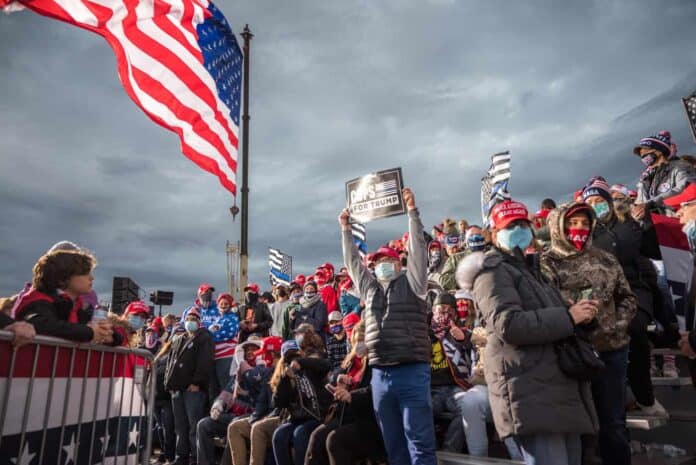


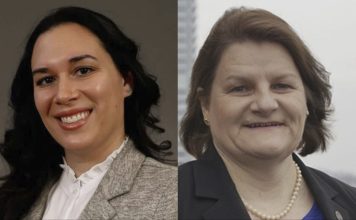
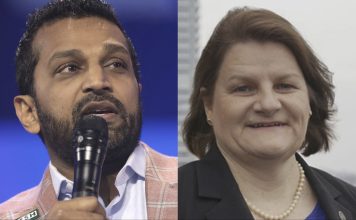

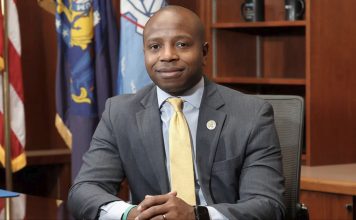
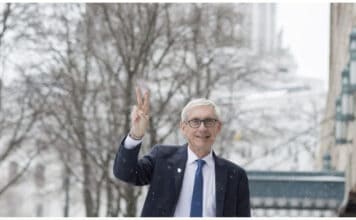

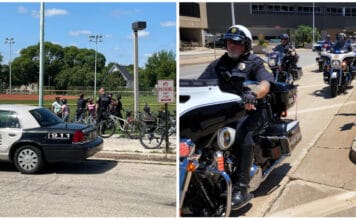

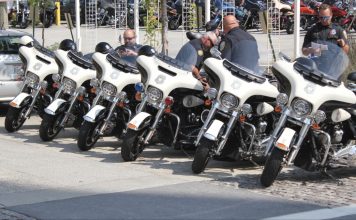







![WATCH: Elon Musk Town Hall Rally in Green Bay [FULL Video]](https://www.wisconsinrightnow.com/wp-content/uploads/2022/04/Elon_Musk_3018710552-356x220.jpg)











